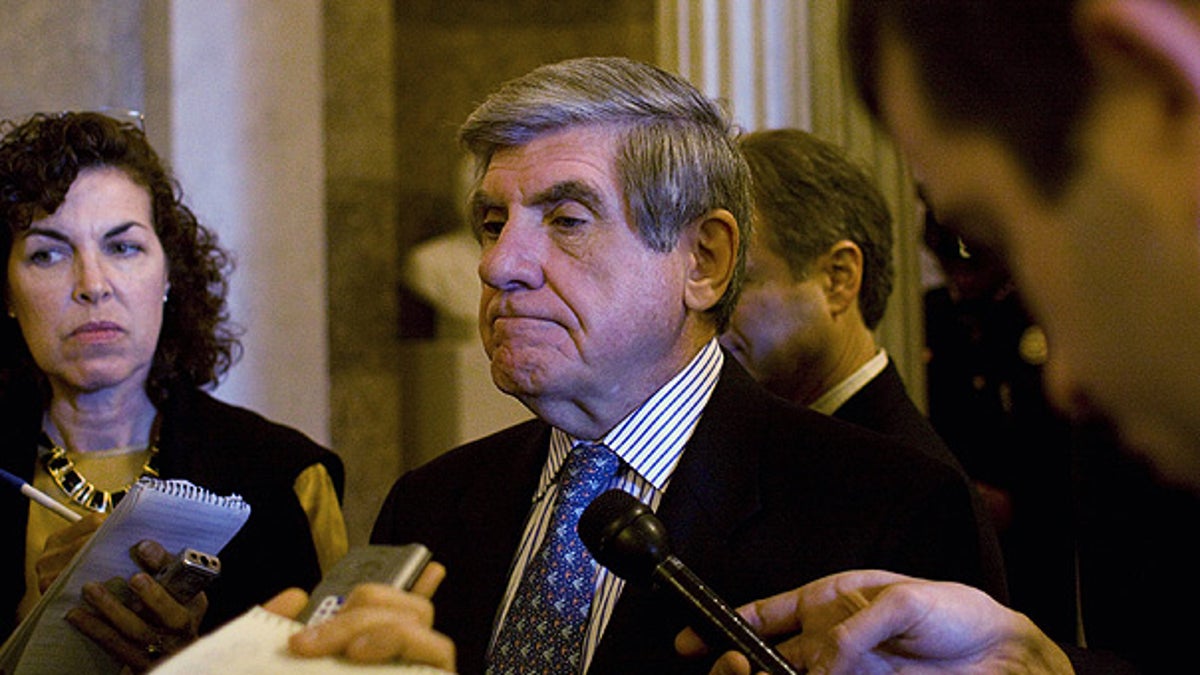
Nov. 3: Sen. Ben. Nelson talks to reporters about health care on Capitol Hill. (AP)
WASHINGTON – Bye bye, Cornhusker Kickback. Hello, special treatment for Tennessee and North Dakota.
Democrats unveiling revisions Thursday to their health care overhaul bill decided to kill the extra $100 million in Medicaid funds for Nebraska that has become a symbol of backdoor deal making.
But the 153 pages of changes to the massive health care package include extra money for hospitals in Tennessee that serve large numbers of low-income patients. And though the bill would revamp the nation's student loan system to make the government the only lender, one bank — the state-owned Bank of North Dakota — would be allowed to continue making student loans.
That provision ended up rubbing Sen. Kent Conrad, D-N.D., the wrong way. Fearing it would become a target by Republicans in what he said is "an overly heated partisan environment," he asked the House late Thursday to remove it from the legislation.
Still alive is special spending for Louisiana, Connecticut, Montana and other states that was included in the health care bill that the Senate approved in December. The House may give it final approval this weekend.
Senior White House officials have sent mixed signals about the special deals. They initially demanded that they be eliminated, but by Sunday senior White House adviser David Axelrod said they only objected to provisions affecting just one state.
White House spokesman Robert Gibbs last week singled out projects from Montana and Connecticut as items President Barack Obama wanted removed. There was resistance, however, from two influential committee chairmen, Democratic Sens. Max Baucus of Montana and Christopher Dodd of Connecticut, and their projects have survived.
To help win the vote of Sen. Ben Nelson, D-Neb., the massive measure the Senate passed on Christmas Eve had included $100 million that only Nebraska would get in added federal Medicaid assistance.
Immediately mocked as the Cornhusker Kickback, critics called it the epitome of special Washington dealing, and even Nelson advocated ending his state's special treatment. Under the changes announced Thursday, the Nebraska provision would be deleted and all states would get additional Medicaid help from Washington.
Also eliminated from the Senate measure was a provision allowing about 800,000 elderly Floridians to keep enhanced Medicare benefits that are being cut for residents of other states.
The changes also include an additional $99 million in 2012 and 2013 for Tennessee hospitals that treat many poor people.
Retiring Rep. Bart Gordon, D-Tenn., has fought for the funds for years to bring the state's aid up to par with the rest of the country, spokeswoman Emily Phelps said. She said their inclusion had nothing to do with his announcement Thursday that he will vote for the final health legislation after opposing an earlier version in November.
The new package also promises new aid for colleges serving minority students, using money the government is supposed to save by no longer paying banks to make student loans. Included are annual payments of $100 million for schools with large numbers of Hispanic students, the same amount for colleges with many black students, and millions more for schools with large numbers of native Americans and other minorities.
Based on Thursday's changes, the health legislation also:
_Retains $300 million in extra Medicaid aid for Louisiana, which had helped win support for the Senate health bill from Sen. Mary Landrieu, D-La. The state is still struggling to recover from Hurricane Katrina.
_Keeps $100 million included in the Senate bill that is expected to go for a public hospital in Connecticut sought by Dodd, who is retiring.
_Preserves language won by Baucus permitting many of the 2,900 residents of Libby, Mont., to qualify for Medicare benefits. Some of them have asbestos-related diseases from a now-shuttered mine.
_Provides an additional $8.5 billion over the next decade for 11 states and the District of Columbia to help them pay for the more generous Medicaid assistance they have been providing low-income residents. These states are Arizona, Delaware, Hawaii, Maine, Massachusetts, Minnesota, New York, Pennsylvania, Vermont, Washington and Wisconsin.
_Maintains a Senate-approved provision giving extra money for hospitals and doctors in North and South Dakota, Montana and Wyoming.





















